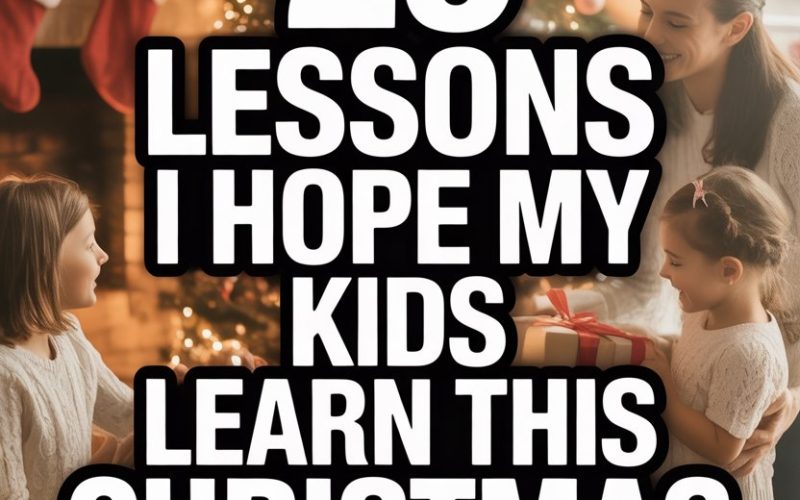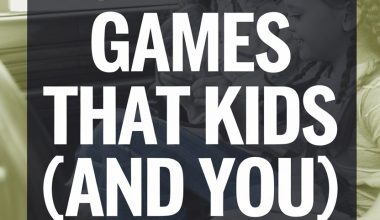Some Christmases are magical. Others, you’re just hoping the tree doesn’t topple over and your kid doesn’t accidentally regift the dog.
Still, underneath the glitter and the gravy stains, this season is stuffed with chances for kids to discover things that matter far beyond what’s wrapped under the tree.
Here are 25 lessons I’m quietly (or sometimes not-so-quietly) hoping will stick with my children this Christmas.
1. Giving feels better than getting
New toys are grand—until they’re buried under January’s clutter. When your child picks a gift, wraps it with their own sticky tape job, and hands it over, the glow sticks around.
Research shows children experience real joy and satisfaction when they give, not just receive. Maybe the best part: you get to witness it all.
2. Patience is a superpower
Advent calendars are basically a 24-day masterclass in waiting. “No, you can’t eat all the chocolates at once.” Learning to spread out excitement, wait for special moments, and savour anticipation?
That’s a gift they’ll use for life—bank queues, job interviews, driving tests.
3. Small acts matter
Not every act of kindness needs a trumpet. A homemade card for Gran. Helping clear the table. Sharing the last mince pie (even if it’s under duress).
These little gestures sprinkle warmth all over Christmas, and help kids see their actions, however tiny, have an impact.
4. Traditions are family glue
Whether your family watches questionable stop-motion reindeer films or always burns the stuffing, these rituals bind everyone together. Even teens with eyerolls will secretly expect that annual pancake breakfast or the way Dad always hangs tinsel sideways.
Psychologists say family traditions help children feel security and belonging.
5. Nobody’s Christmas is perfect
The dog chews a bauble. Aunt Carol brings up politics at dinner. Someone’s always in tears by 3 p.m.
Reminding your kids (and yourself) that Christmas is a highlight reel and blooper reel rolled together takes the pressure off and makes room for real, sometimes messy, joy.
6. People come before presents
Sure, that new gadget is exciting. But the most lasting memories come from board games, snowball fights, or giggling through a family movie (even when Dad falls asleep halfway through).
Kids notice when we prioritise time together over stuff.
7. Gratitude can be learned
If your child’s first reaction is “That’s it?” after unwrapping Grandma’s knitted hat, don’t panic. Gratitude is a skill, not a birthright.
Make it part of your routine to point out what went well, what you loved, and who made an effort—even if the hat is itchy.
8. Surprises don’t have to cost a fortune
The best Christmas magic isn’t always branded or expensive. A treasure hunt, silly charades, or an indoor ‘snowball’ fight with balled-up socks can leave a bigger mark than the priciest toy.
9. Everyone needs a break
Even Santa needs a nap. Sometimes, a little space from the chaos—be it a walk, a book, or a quiet room—can turn a frazzled kid (or parent) back into a human.
Model this for your kids: “Mum’s taking five minutes to herself, then I’ll be back.”
10. It’s okay to feel all the feelings
Christmas can stir up excitement, disappointment, jealousy, or even grief, especially if someone is missing. Allowing space for real feelings means fewer meltdowns and more genuine connection.
Naming those emotions—“You’re sad we can’t visit Cousin Ellie, and that’s okay”—is a parenting win.
11. Sharing isn’t just for toddlers
Christmas morning sometimes looks like a toy shop exploded. But as kids grow, encouraging them to share—be it treats, toys, or time—helps them value generosity over possession.
Bonus: less sibling squabbling (well, sometimes).
12. Experiences beat things
Ask a group of adults what they remember from childhood Christmases. It’s rarely a specific toy. More often, it’s baking biscuits, going carolling, or that ill-advised family singalong.
Experiences linger; plastic trinkets, not so much.
13. Mistakes are part of the fun
Burnt cookies, tangled lights, and missing batteries—these oops moments are the stories that get retold (and grow funnier each year). Teaching kids to laugh at slip-ups rather than despair sure beats perfectionism.
14. Appreciation for difference
Not every family celebrates the same way (or even on the same day). Encouraging kids to ask questions about other holiday traditions, foods, or beliefs builds curiosity and respect.
Here’s where books and festive TV specials can help open windows to the world.
15. Santa isn’t the reason for the season
Whether your family is religious or secular, it’s worth talking about what you believe gives Christmas meaning—connection, kindness, faith, generosity. Presents are lovely, but they’re not the whole show.
16. It’s possible to say no
There will be requests for endless sweets, late bedtimes, or one more episode of that Christmas cartoon. Setting boundaries kindly but firmly teaches kids to respect limits—yours, theirs, and everyone else’s.
17. Helping others makes Christmas richer
Dropping off food at a shelter, writing cards to neighbours, or just inviting someone who’s alone for dinner shows kids the holidays aren’t only about their own wish lists.
Volunteering as a family boosts empathy and happiness, according to this University of British Columbia study.
18. The best gifts are sometimes homemade
A wobbly ornament, a poem, or a framed photo collage can mean far more than anything Amazon can deliver. Encourage creativity. Remind them: love doesn’t need batteries.
19. Quiet moments matter
Between the jingles and the wrapping paper carnage, pausing to read a story together, stare at the tree lights, or just sit in cuddly silence can be the real highlight. Sometimes, peace on earth starts in a blanket fort.
20. Manners count—especially when you’re excited
“Thank you” goes a long way when Auntie hands over bath salts instead of Lego. Practising graciousness—even when the gift is, well, underwhelming—helps kids handle all kinds of social situations.
21. You can’t please everyone
Someone will always prefer turkey to ham. Someone else wants the crackers a different colour. Kids noticing that you can’t keep everyone deliriously happy, and that’s okay, is pure gold for their future social lives.
22. Planning and preparing is part of the fun
Involving kids in making lists, setting the table, or wrapping gifts gives them ownership and pride in the festivities. It also means less work for you, which is the real Christmas miracle.
23. Apologies fix (almost) everything
Someone’s feelings got bruised during pass-the-parcel, or a sibling “accidentally” ate your chocolate orange. Owning up with a real apology smooths the way for more fun—and less drama.
24. Memories are made, not bought
The best stories rarely begin “Remember that bath bomb set you got?” Usually, it’s “Remember when Dad wore the elf hat to the shops?” Encourage silliness, spontaneity, and yes—even a bit of chaos.
25. Love really is the point
Beneath all the wrapping paper and the chaos, it’s love that holds the whole jolly mess together. Kids who feel secure, cherished, and connected will carry that warmth far longer than anything you can fit under the tree.
Passing It On, One Christmas at a Time
This year, as you sweep up pine needles and try to figure out which charger fits which gadget, notice the little lessons taking root in your kids (and yourself).
The magic isn’t in the presents—it’s in the presence, the laughter, and those slightly wonky family traditions.
Here’s to a season stuffed with teachable moments, sticky fingers, and memories worth keeping. Cheers!





